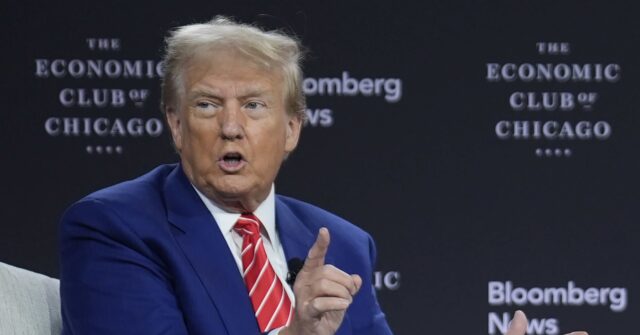Former President Donald Trump recently appeared in an interview at the Economic Club of Chicago, where he addressed inquiries regarding his alleged communications with Russian President Vladimir Putin since leaving office. During the discussion, led by Bloomberg News editor-in-chief John Micklethwait, Trump was asked directly whether he had spoken to Putin at any point after his presidency. Trump notably refrained from confirming or denying any conversations but asserted that maintaining communication with leaders of nuclear-armed nations could be beneficial. He framed this stance in the context of diplomatic relations, suggesting that having a friendly rapport could positively impact national interests.
Micklethwait, adopting a confrontational demeanor throughout the discussion, referenced claims from Bob Woodward’s recent publication that Trump had communicated with Putin at least seven times after his term ended. In response, Trump emphasized the wisdom of staying in contact with foreign leaders, reinforcing the idea that constructive relationships can yield favorable outcomes for the United States. He expressed his view that being friendly, rather than adversarial, with influential figures on the global stage is not merely prudent but could also enhance the country’s international standing.
Additionally, Trump defended his previous actions regarding Russian relations, outlining a record of toughness demonstrated through specific policies, such as the imposition of sanctions on the Nord Stream 2 pipeline. He positioned himself as someone who could balance a personal rapport with Putin while simultaneously taking firm stances against Russian aggression. This duality—being both friendly and tough—was presented as a key component of his foreign policy approach during his presidency, which he claimed contributed to a period of relative stability, especially considering the absence of military invasions by Russia during his time in office.
Trump contrasted his administration’s record on Russia with those of his predecessors, suggesting that the claims of his subservience to Putin are unfounded. He pointed out that while he was in power, no new conflicts initiated by Russia occurred, a claim he used to bolster his argument against the narrative pushed by some Democrats and media outlets that depict him as overly compliant with Russian interests. This assertion served to highlight a perceived inconsistency in how various administrations have managed relations with Russia, framing himself as a leader who maintained peace through strength and engagement.
The interview continues to underscore the polarized perceptions of Trump and his presidency, as well as the ongoing narrative battles regarding his foreign policy decisions. While some argue that his approach to Russia was dangerously accommodating, others maintain that Trump’s interactions were pragmatic and ultimately beneficial. This dichotomy reflects broader divisions in American politics, wherein foreign policy stances often intertwine with issues of national identity, security, and partisanship, complicating public discourse on the effectiveness of different administrations.
In summation, Trump’s recent remarks in Chicago offer insight into his views on foreign relations, particularly with Russia, as he navigates the ongoing scrutiny of his presidency. His emphasis on the importance of maintaining dialogue with global leaders, coupled with claims of a strong record on Russian aggression, highlights the complex interplay of diplomacy and strategy that characterizes his approach. As he seeks to reclaim a prominent political role, these discussions not only shed light on his past actions but also frame the ongoing debate about America’s role in the world and how leadership can influence the course of international relations.

